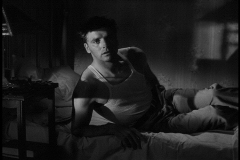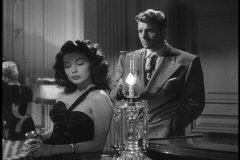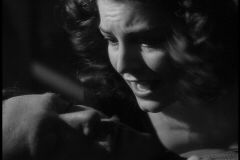The Killers (Robert Siodmak, 1946)
 The title of Robert Sidomak’s The
Killers comes from a famed short story written by Ernest Hemingway, and its
opening scenes are a direct dramatization of that tale of unspecified regret. In
them, Burt Lancaster plays a Swede with an inexplicable death wish. In print,
the yarn has a terse, hard-edged quality that’s lyric in its haunting
brutality. When readers are left at the end of the story, outside of the
Swede’s resignation, they’re left with one of literature’s most chilling
unanswered mysteries. This adaptation uses the story’s mystery as a jumping
off point, and attempts to provide an adequate solution to a question that was
probably better left open-ended. It
adopts a story structure similar to Citizen
Kane in which a series of flashbacks highlight an intrepid investigator
attempts to solve the mystery of the Swede’s regret. As such, it’s an
unfaithful, actively harmful adaptation of Hemingway’s story, but it’s also
a film that has considerable virtues when one looks at it in a context that’s
divorced from the story that serves as its basis.
The title of Robert Sidomak’s The
Killers comes from a famed short story written by Ernest Hemingway, and its
opening scenes are a direct dramatization of that tale of unspecified regret. In
them, Burt Lancaster plays a Swede with an inexplicable death wish. In print,
the yarn has a terse, hard-edged quality that’s lyric in its haunting
brutality. When readers are left at the end of the story, outside of the
Swede’s resignation, they’re left with one of literature’s most chilling
unanswered mysteries. This adaptation uses the story’s mystery as a jumping
off point, and attempts to provide an adequate solution to a question that was
probably better left open-ended. It
adopts a story structure similar to Citizen
Kane in which a series of flashbacks highlight an intrepid investigator
attempts to solve the mystery of the Swede’s regret. As such, it’s an
unfaithful, actively harmful adaptation of Hemingway’s story, but it’s also
a film that has considerable virtues when one looks at it in a context that’s
divorced from the story that serves as its basis.
 The flowery Hollywoodized dialog of
Siodmak’s film (e.g. “Mister, when it comes to dates, 1492 is the only one
that I can remember!”) stands in sharp contrast to the terse, perfunctory
nature of Hemingway’s prose, but that’s because The
Killers feels less like a literary adaptation than textbook noir.
Thematically, it’s similar to just about every classic work of the genre.
Through its futile quest, it reminds us that love corrupts, that the pursuit of
truth can often be made irrelevant by the world (specifically here by a business
strategy that assumes loss due to anticipated dishonesty), and that the
suggestion that a new start is possible is frequently an illusion. Its
protagonist, a boxer who’s been chewed up and spit out by underworld society,
is classic. Visually, the movie inhabits a world where each rare instance of
natural light only reinforces the prevailing dark. Its structure, as noted,
relies on formula, yet realizes that that formula can be satisfying because its
series of mini-monologues lends itself to an endless parade of great
performances by character actors.
The flowery Hollywoodized dialog of
Siodmak’s film (e.g. “Mister, when it comes to dates, 1492 is the only one
that I can remember!”) stands in sharp contrast to the terse, perfunctory
nature of Hemingway’s prose, but that’s because The
Killers feels less like a literary adaptation than textbook noir.
Thematically, it’s similar to just about every classic work of the genre.
Through its futile quest, it reminds us that love corrupts, that the pursuit of
truth can often be made irrelevant by the world (specifically here by a business
strategy that assumes loss due to anticipated dishonesty), and that the
suggestion that a new start is possible is frequently an illusion. Its
protagonist, a boxer who’s been chewed up and spit out by underworld society,
is classic. Visually, the movie inhabits a world where each rare instance of
natural light only reinforces the prevailing dark. Its structure, as noted,
relies on formula, yet realizes that that formula can be satisfying because its
series of mini-monologues lends itself to an endless parade of great
performances by character actors.
 Siodmak directs skillfully enough that
the dialog feels appropriate, though. His handling of the film is solid
throughout, and memorable moments are frequent. In one noteworthy shot, he
presents Lancaster’s shifting romantic fixation by shifting the framing of
three actors. Another skillful sequence shows the action of a heist on screen
while a voiceover recounts how the news media described the robbery. That’s
not to say that The Killers is Kane’s technical equal, or anything, but that it acquits itself
well as a showcase for its director. Trying to make a feature out of
Hemingway’s story, which held its brevity and elusiveness as one of its prime
assets, is a thankless task, to be certain. Despite the predictability of the
story’s eventual solution to Hemingway’s existential dilemma (think tortured
romance), The Killers is effective in most of its particulars along the
way. In summation, it’s those details of performance, structure, and image,
and the convincing world of dread it creates that makes The Killers a movie that works in spite of any betrayal of its
source material.
Siodmak directs skillfully enough that
the dialog feels appropriate, though. His handling of the film is solid
throughout, and memorable moments are frequent. In one noteworthy shot, he
presents Lancaster’s shifting romantic fixation by shifting the framing of
three actors. Another skillful sequence shows the action of a heist on screen
while a voiceover recounts how the news media described the robbery. That’s
not to say that The Killers is Kane’s technical equal, or anything, but that it acquits itself
well as a showcase for its director. Trying to make a feature out of
Hemingway’s story, which held its brevity and elusiveness as one of its prime
assets, is a thankless task, to be certain. Despite the predictability of the
story’s eventual solution to Hemingway’s existential dilemma (think tortured
romance), The Killers is effective in most of its particulars along the
way. In summation, it’s those details of performance, structure, and image,
and the convincing world of dread it creates that makes The Killers a movie that works in spite of any betrayal of its
source material.
62
Jeremy Heilman
01-11-04